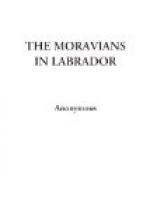Anxious, therefore, to retain them around their station, the brethren proposed a method for rendering them comfortable during the winter, by building a store-house where their provisions might be laid up, so that the superfluities of summer should supply the wants of winter. But the savages could not understand the use of refusing to gratify their present appetites in order to provide for any distant emergency—they preferred to revel in the plenty of summer, and to rove to other places in winter in search of food, by which propensity they were scattered above one hundred and twenty miles along the coast. Yet, even these wanderers were the means of exciting the attention of their kindred to the gospel, by telling them of the strange things they had heard at Nain. It was therefore resolved to follow the leadings of Providence, and, as soon as possible, to establish two other missionary settlements, the one towards the north, the other south of the present.
For this purpose, application was made to the Society of the Brethren in London, who, entering fully into their views, obtained from the Privy Council an order granting them liberty to search out and take possession of land sufficient for their object. A commission was accordingly sent for the brethren to explore the coast, and Brazen, Lister, Lehman, and Jans Haven, offered themselves for this service. On the 5th of August they set out for the north. “But just as we were setting out,” says Jans Haven, “an uncommon horror and trembling seized me, so that, contrary to my former experience, I was exceedingly intimidated, and wished rather to stay at home.” They proceeded however, and were every where received in a friendly manner by the Esquimaux, and invited to settle among them. Their return justified the presentiment of Jans Haven. Not far from Cape Keglapeit they had the misfortune to encounter a dreadful storm, and when only three miles from Nain, their vessel struck on a sunk rock where she was wrecked.
After a fearful night, about 2 o’clock next morning they attempted to get at the boat that belonged to their shallop, but through the violence of the waves it was driven on a rock and almost dashed to pieces. Brazen and Lehman were drowned, but Haven and Lister, together with the sailors, succeeded in reaching a barren rock, where they suffered much from cold and hunger—where they must have perished miserably had they not providentially got their boat, which was in tatters, drawn on shore, and with all the woollen clothes and seal skins they could spare, patched it together. Still it was a wretched barque, but they had no other resource, and were obliged to venture to sea in it such as it was. The wind was favourable, and at length they happily met Manamina in his kaiak, who towed them safely to Nain, where they arrived on the evening of the 18th of September, truly thankful to the Lord for his wonderful assistance. “After our return,” Haven says in the




